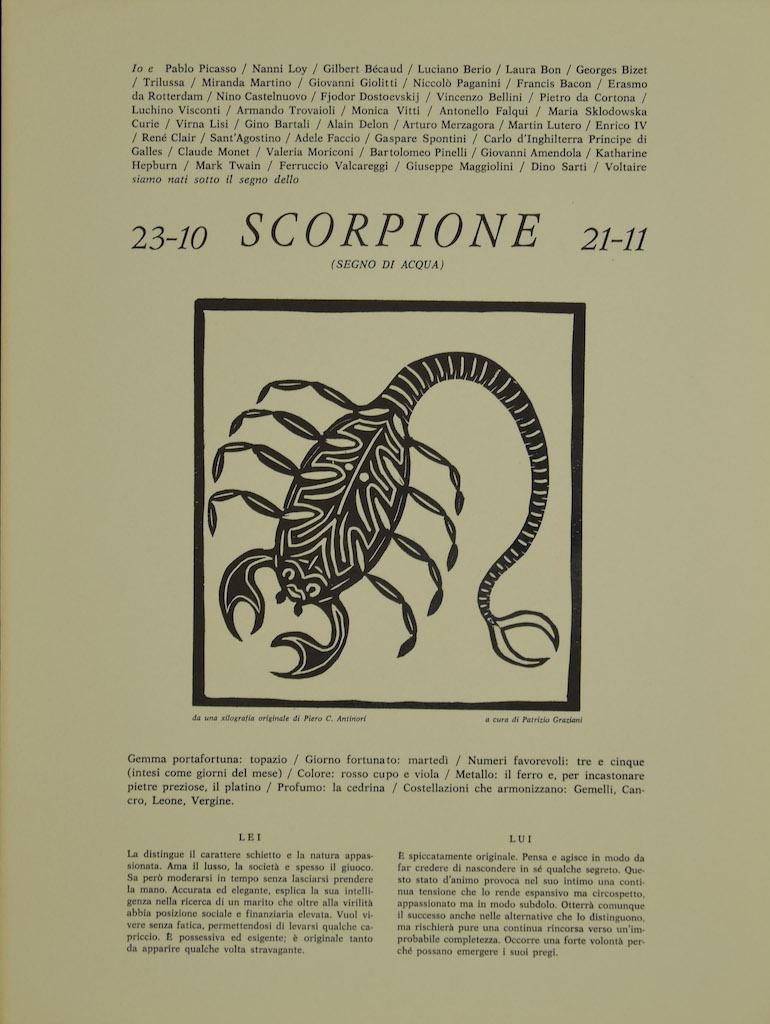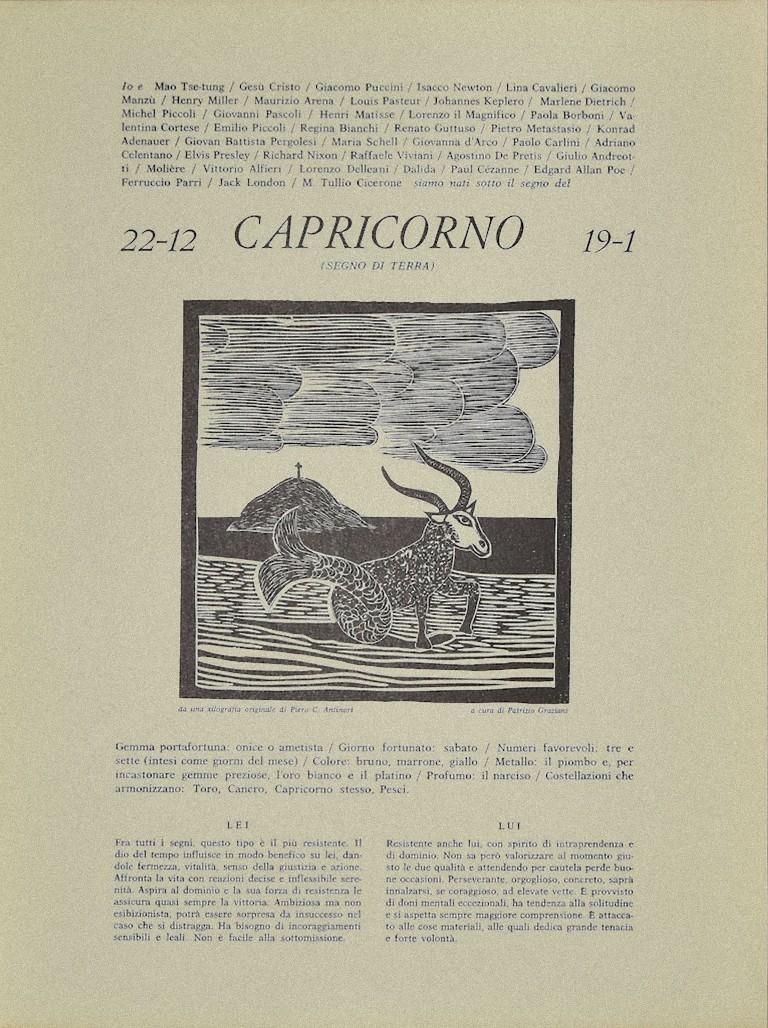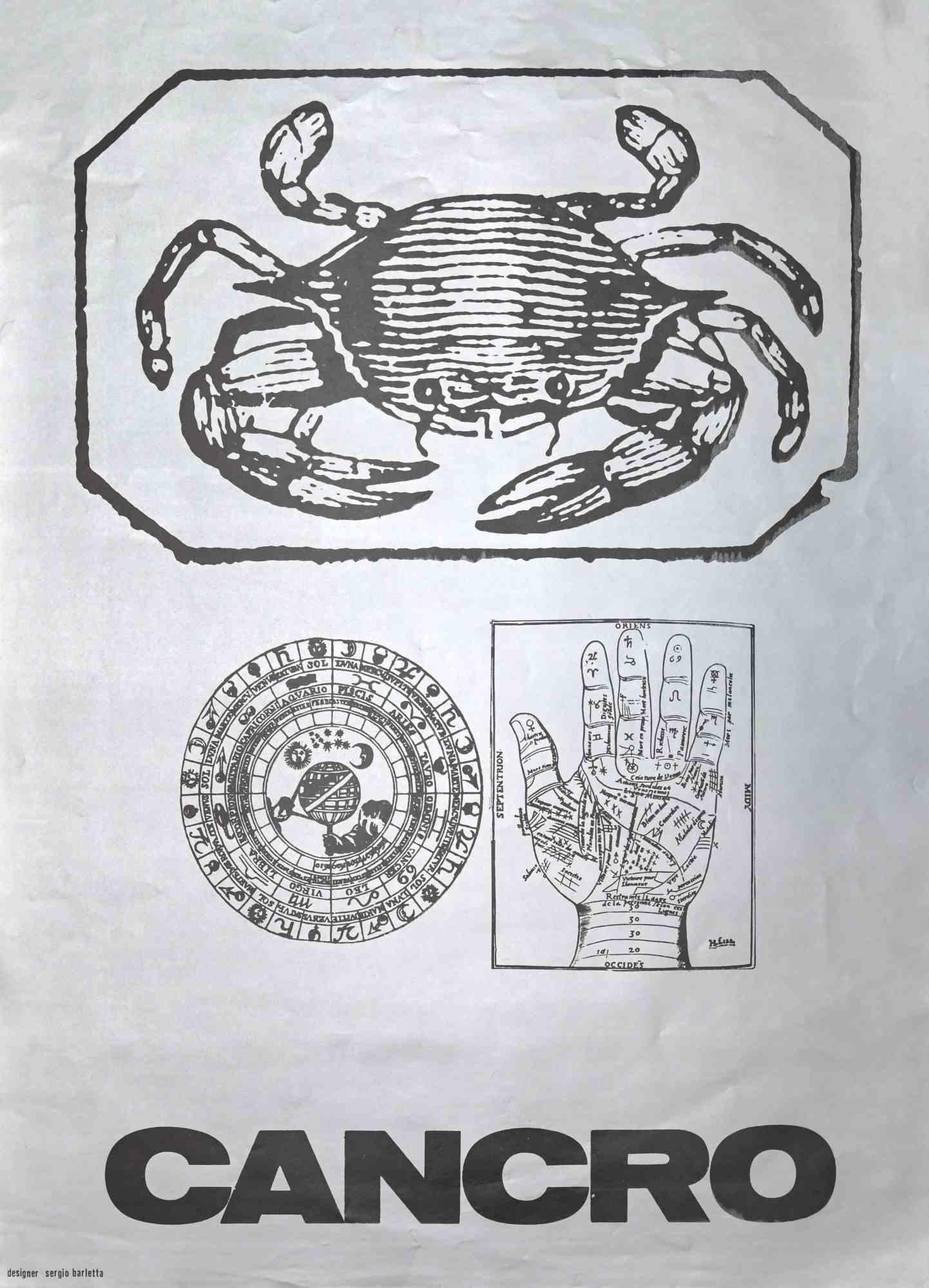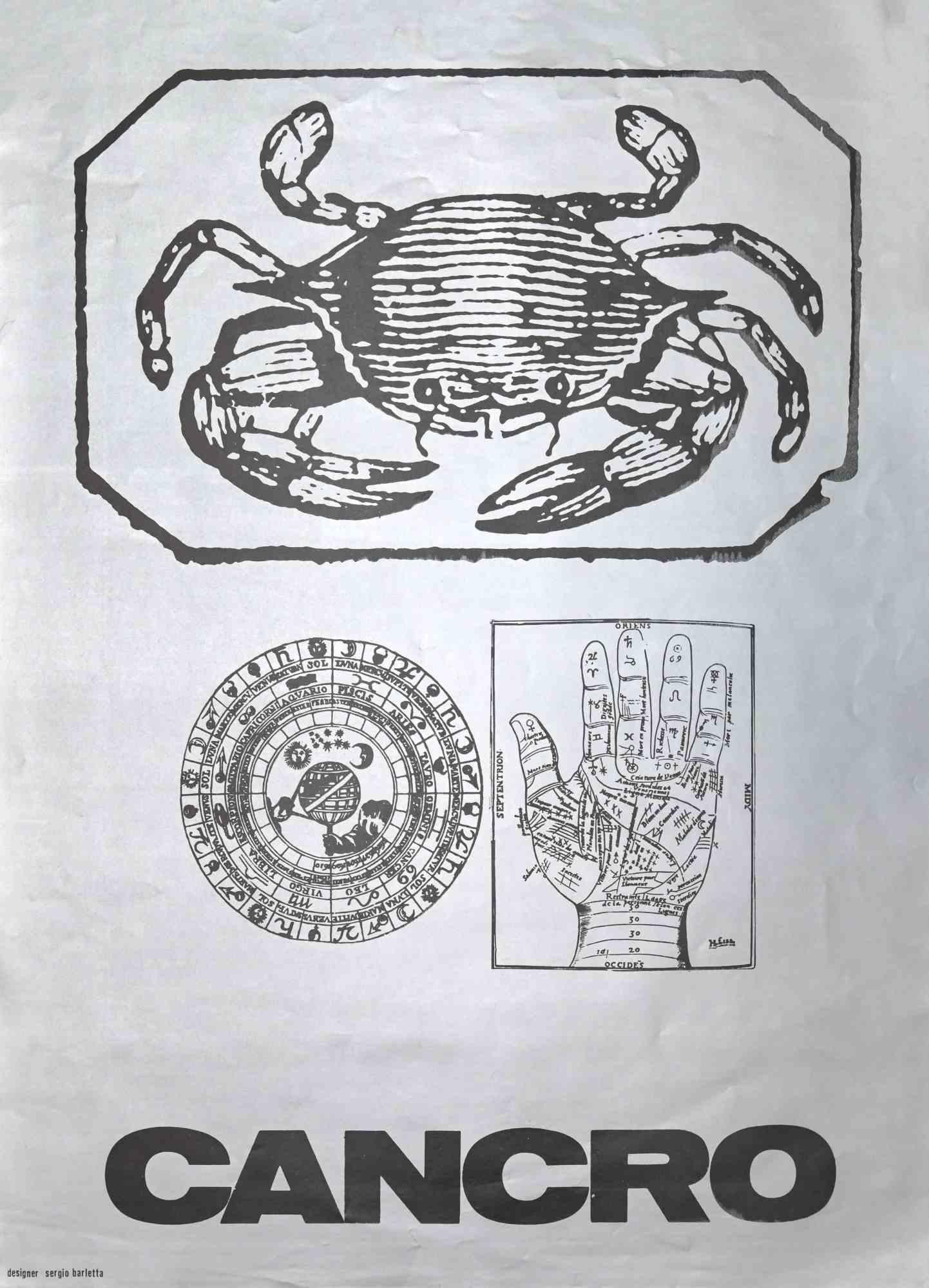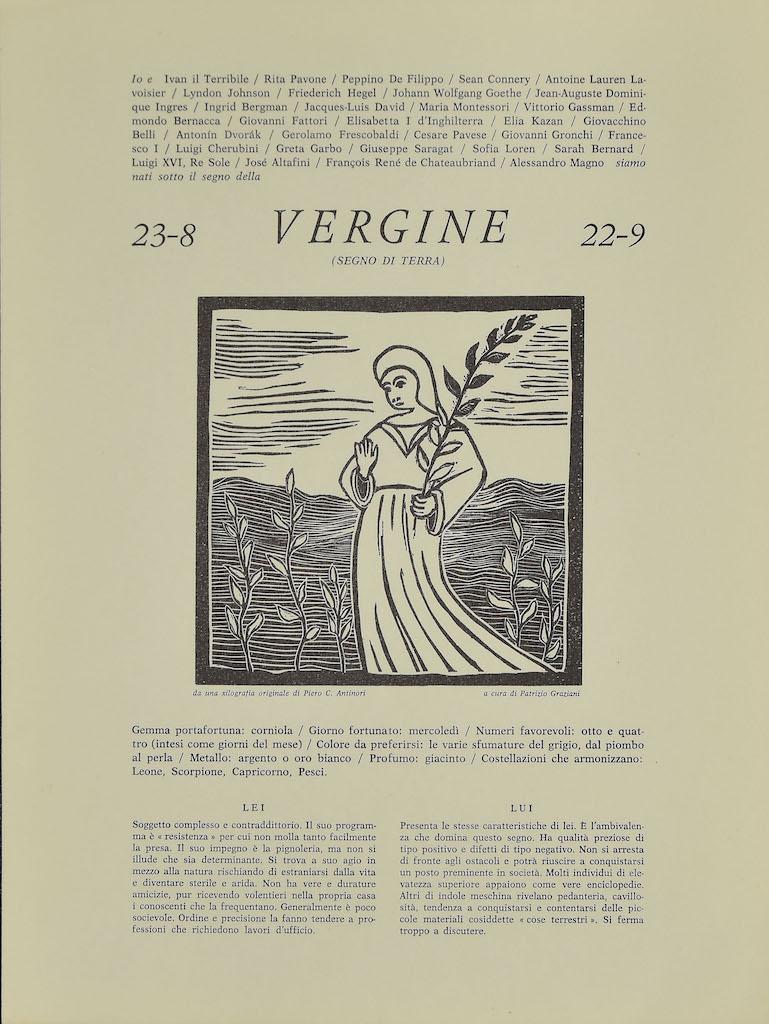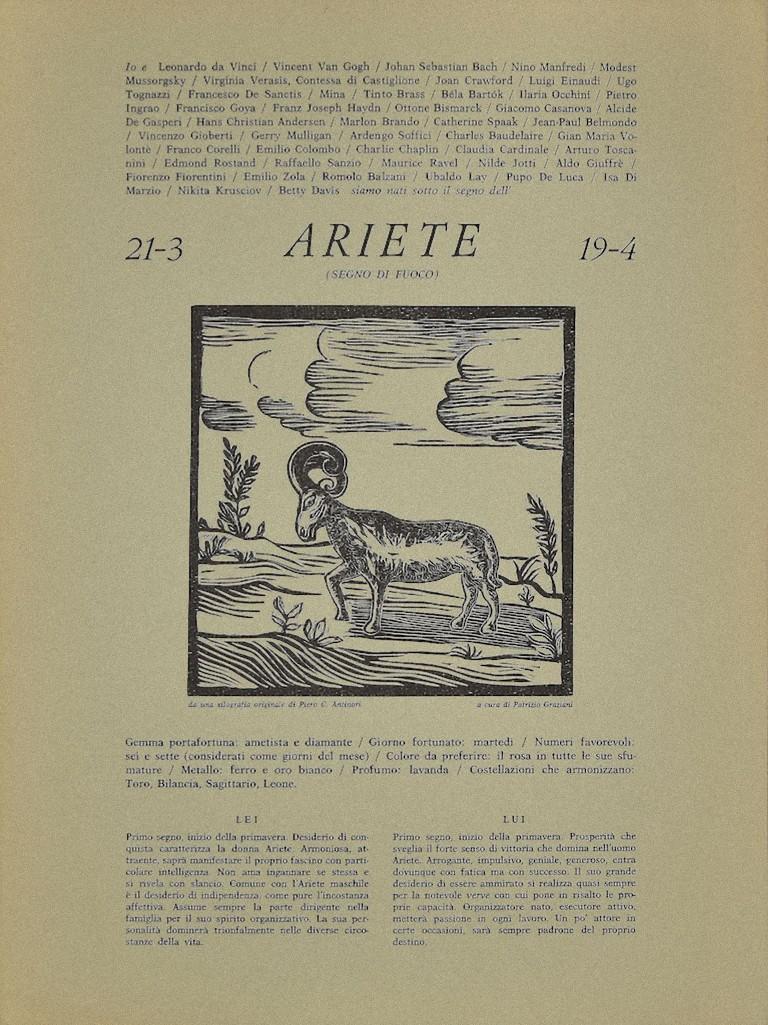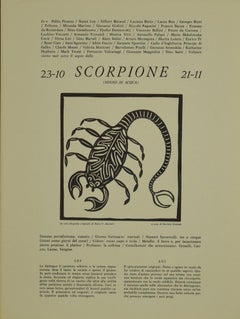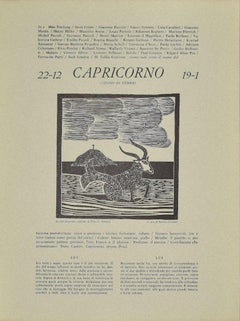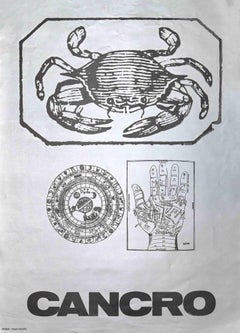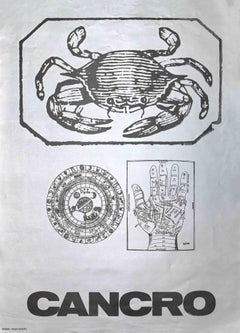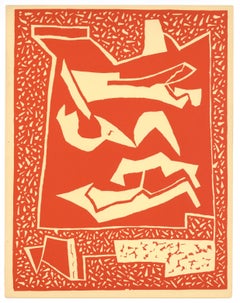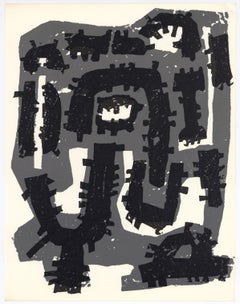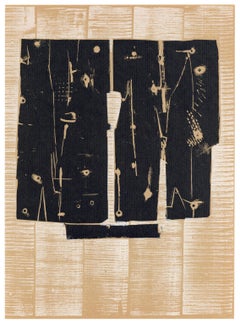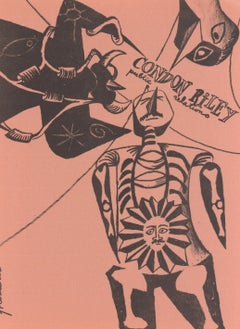Items Similar to Cancer - Original Woodcut Print by P. C. Antinori - 1970s
Want more images or videos?
Request additional images or videos from the seller
1 of 5
Piero C. Antinori.Cancer - Original Woodcut Print by P. C. Antinori - 1970s1970s
1970s
$297.62
£221.02
€250
CA$409.11
A$456.05
CHF 240.04
MX$5,528.63
NOK 3,056.12
SEK 2,841.45
DKK 1,903.27
About the Item
Zodiac Signs - Cancer is original Black and white xilography artwork, realized by Italian artist Piero C. Antinori.
Excellent condition.
Written on the lower left; original woodcut print of Piero C. Antinori. and on the lower right: Curator Patrizio Graziani
With the description in Italian, titled at the top of the image, on the lower divided into a two-part, prediction of future for women on the left side and for men on the right.
From "The Zodiac Signes" series of the artist. The 12 signs are Aries, Taurus, Gemini, Cancer, Leo, Virgo, Libra, Scorpio, Sagittarius, Capricorn, Aquarius, and Pisces, which folks believe that different sun signs of the zodiac present different characteristics and destiny and describe the circle of 12 divisions of celestial longitude that are centered upon the path of the sun, that have their origin in medieval Byzantine codices, when many ancient horoscopes were preserved.
- Creator:Piero C. Antinori.
- Creation Year:1970s
- Dimensions:Height: 15.75 in (40 cm)Width: 11.82 in (30 cm)Depth: 0.04 in (1 mm)
- Medium:
- Movement & Style:
- Period:
- Framing:Framing Options Available
- Condition:Insurance may be requested by customers as additional service, contact us for more information.
- Gallery Location:Roma, IT
- Reference Number:Seller: M-1108391stDibs: LU65037139422
About the Seller
4.9
Platinum Seller
Premium sellers with a 4.7+ rating and 24-hour response times
1stDibs seller since 2017
7,646 sales on 1stDibs
Typical response time: 2 hours
- ShippingRetrieving quote...Shipping from: Grasse, France
- Return Policy
Authenticity Guarantee
In the unlikely event there’s an issue with an item’s authenticity, contact us within 1 year for a full refund. DetailsMoney-Back Guarantee
If your item is not as described, is damaged in transit, or does not arrive, contact us within 7 days for a full refund. Details24-Hour Cancellation
You have a 24-hour grace period in which to reconsider your purchase, with no questions asked.Vetted Professional Sellers
Our world-class sellers must adhere to strict standards for service and quality, maintaining the integrity of our listings.Price-Match Guarantee
If you find that a seller listed the same item for a lower price elsewhere, we’ll match it.Trusted Global Delivery
Our best-in-class carrier network provides specialized shipping options worldwide, including custom delivery.More From This Seller
View AllScorpio - Original Woodcut Print by P. C. Antinori - 1970s
Located in Roma, IT
Zodiac Signs - Scorpio is original Black and white woodcut print, realized by Italian artist Piero C. Antinori.
Excellent condition.
Written on the lower left; Original woodcut by ...
Category
1970s Contemporary Figurative Prints
Materials
Woodcut
Capricorn - Original Woodcut by P. C. Antinori - 20th Century
Located in Roma, IT
Zodiac Signs - Capricorn is original Black and white xilography artwork, realized by Italian artist Piero C. Antinori.
Excellent condition.
Written on the lower left; Original xilo...
Category
20th Century Figurative Prints
Materials
Woodcut
Cancer - Screen Print by Sergio Barletta - 1973
By Sergio Barletta
Located in Roma, IT
Cancer is a screen print on grey paper realized by Sergio Barletta in 1973.
68 x 49 cm.
Good conditions!
Sergio Barletta (1934) is an Italian cartoonist and illustrator, wh...
Category
1970s Modern Figurative Prints
Materials
Screen
Cancer - Screen Print by Sergio Barletta - 1973
By Sergio Barletta
Located in Roma, IT
Cancer is a screen print on grey paper realized by Sergio Barletta in 1973.
68 x 49 cm.
Good conditions!
Sergio Barletta (1934) is an Italian cartoonist and illustrator, who...
Category
1970s Modern Figurative Prints
Materials
Screen
Virgo - Original Woodcut by P. C. Antinori - 20th Century
Located in Roma, IT
Zodiac Signs - Virgo is original Black and white woodcut, realized by Italian artist Piero C. Antinori.
Excellent condition.
Written on the lower left; Original xilography of Piero...
Category
20th Century Figurative Prints
Materials
Woodcut
Zodiac Signs - The Ram - Original Woodcut by P. C. Antinori - 1970s
Located in Roma, IT
Zodiac Signs - The Ram is original Black and white woodcut print, realized by Italian artist Piero C. Antinori.
Excellent condition.
Written on the lower left; Original woodcut by ...
Category
1970s Contemporary Figurative Prints
Materials
Woodcut
You May Also Like
original linocut
By Alberto Magnelli
Located in Henderson, NV
Medium: original linoleum cut. Printed in 1938 for the art revue XXe Siecle (issue number 4). Size: 12 1/2 x 9 3/4 inches (317 x 248 mm). Not signed.
Condition: there are pinholes i...
Category
1930s Prints and Multiples
Materials
Linocut
original woodcut
By Raoul Ubac
Located in Henderson, NV
Medium: original woodcut. This original Raoul Ubac woodcut was issued in 1958 for the hard-to-find XXe Siecle (No. 10), published in Paris by San Lazzaro. Sheet size 12 3/8 x 9 1/2 i...
Category
1950s Figurative Prints
Materials
Woodcut
original woodcut
By Pietro Consagra
Located in Henderson, NV
Medium: original woodcut. This is a richly inked impression printed on laid paper, executed for the hard to find XXe Siecle Christmas issue (No. 13), published in Paris in 1959 by Sa...
Category
1950s Figurative Prints
Materials
Woodcut
original lithograph
By Antonio Frasconi
Located in Henderson, NV
Medium: original lithograph. This lithograph is from the rare 1951 "Improvisations" portfolio, published by the Artists Equity Association of New York on the occasion of the 1951 Spr...
Category
1950s Prints and Multiples
Materials
Lithograph
1967 Woodcut Signed Limited Edition
Located in Rochester Hills, MI
Michael Rothenstein
RIP - 1967
Print - woodcut 25'' x 30''inches
Edition: signed in pencil and marked sixteen / thirty five
Michael Rothenstein (1908-1993) Painter of figurative a...
Category
1960s Modern Abstract Prints
Materials
Woodcut
$640 Sale Price
20% Off
Pietro Consagra Italian Mod Abstract Expressionist Forma Brutalist Lithograph
By Pietro Consagra
Located in Surfside, FL
Pietro Consagra (Italian, 1920-2005).
Hand signed in pencil and numbered limited edition color lithograph on Magnani paper.
Embossed stamp with limited edition numbers in pencil to lower left, and having artist pencil signature to lower right.
(from a limited edition of 80 with 15 artist's proofs)
Published by Stamperia 2RC, Rome Italy and Marlborough Gallery, Rome, Italy.
Abstract Modernist work in colors, produced in the style of the Forma art movement of Postwar Italy, of which the artist was a prominent member.
Pietro Consagra (1920 – 2005) was an Italian Post war artist working in painting, printmaking and sculpture. In 1947 he was among the founding members of the Forma 1 group of artists, proponents of structured abstraction.
Consagra was born on 6 October 1920 in Mazara del Vallo, in the province of Trapani in south-western Sicily, to Luigi Consagra and Maria Lentini. From 1931 he enrolled in a trade school for sailors, studying first to become a mechanic, and later to become a captain. In 1938 he moved to Palermo, where he enrolled in the liceo artistico; despite an attack of tuberculosis, he graduated in 1941, and in the same year signed up at the Accademia di Belle Arti, where he studied sculpture under Archimede Campini. After the Invasion of Sicily and the Allied occupation of Palermo in 1943, Consagra found work as a caricaturist for the American Red Cross club of the city; he also joined the Italian Communist Party. Early in 1944, armed with a letter of introduction from an American officer, he travelled to Rome. There he came into contact with the Sicilian artist Concetto Maugeri, and through him with Renato Guttuso, who was also Sicilian and who introduced him to the intellectual life of the city and to other postwar artists such as Leoncillo Leonardi, Mario Mafai and Giulio Turcato. Consagra signed up at the Accademia di Belle Arti di Roma in September 1944 and studied sculpture there under Michele Guerrisi, but left before completing his diploma.
In 1947, with Carla Accardi, Ugo Attardi, Piero Dorazio, Mino Guerrini, Achille Perilli, Antonio Sanfilippo and Giulio Turcato, Consagra started the artist's group Forma 1, which advocated both Marxism and structured abstraction.
Steadily Consagra's work began to find an audience. Working primarily in metal, and later in marble and wood, his thin, roughly carved reliefs, began to be collected by Peggy Guggenheim and other important patrons of the arts. He showed at the Venice Biennale eleven times between 1950 and 1993, and in 1960 won the sculpture prize at the exhibition. During the 1960s he was associated with the Continuità group, an offshoot of Forma I, and in 1967 taught at the School of Arts in Minneapolis. Large commissions allowed him to begin working on a more monumental scale, and works of his were installed in the courtyard of the Foreign Ministry in Rome and in the European Parliament, Strasbourg. His work is found in the collections of The Tate Gallery, London, in Museo Cantonale d'Arte of Lugano and the Museum of Modern Art, Paris, and the National Gallery of Art in Washington, D.C..
Consagra returned to Sicily where he sculpted a number of significant works during the 1980s. With Senator Ludovico Corrao, he helped created an open-air museum in the new town of Gibellina, after the older town had been destroyed in the earthquake of 1968. Consagra designed the gates to the town's entrance, the building named "Meeting" and the gates to the cemetery, where he was later buried.
In 1952 Consagra published La necessità della scultura ("the need for sculpture"), a response to the essay La scultura lingua morta ("sculpture, a dead language"), published in 1945 by Arturo Martini. Other works include L'agguato c'è ("the snare exists", 1960), and La città frontale ("the frontal city", 1969). His autobiography, Vita Mia, was published by Feltrinelli in 1980. In 1989 a substantial retrospective exhibition of work by Consagra was shown at the Galleria Nazionale d'Arte Moderna in Rome; in 1993 a permanent exhibition of his work was installed there. In 1991 his work was shown in the Hermitage Museum in St. Petersburg. In 2002 the Galerie der Stadt Stuttgart opened a permanent exhibition of his work. He was one of ten artists invited by Giovanni Carandente, along with David Smith, Alexander Calder, Arnaldo Pomodoro, Lynn Chadwick, and Beverly Pepper, to fabricate works in Italsider factories in Italy for an outdoor exhibition, "Sculture nella città", held in Spoleto during the summer of 1962. He was included in the The 1962 International Prize for Sculpture the jury included Argan, Romero Brest and James Johnson Sweeney the former director of the Solomon R. Guggenheim Museum in New York. The participants included Louise Nevelson and John Chamberlain for the United States; Lygia Clark for Brazil; Pietro Consagra, Lucio Fontana, Nino Franchina, and Gió Pomodoro for Italy; Pablo Serrano for Spain; and Eduardo Paolozzi, William Turnbull, and Kenneth Armitage for England. Gyula Kosice, Noemí Gerstein, Julio Gero, Naum Knop...
Category
1960s Abstract Expressionist Abstract Prints
Materials
Lithograph
